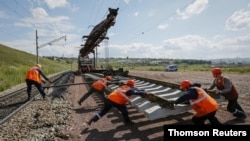Russia is considering using convicts to expand a railway line in the far east, a government document showed, as Moscow faces migrant labor shortages due to COVID-19.
Restrictions linked to the pandemic have prompted many migrant workers to leave Russia and authorities have warned construction projects could be slowed down.
Russia has already brought in soldiers to build a segment of its Baikal-Amur Mainline railway (BAM) in the far east to transport more coal and metal to ports for export to Asia.
It is now also considering convict laborers to work on the line which is being expanded as part of a more than 6 trillion rouble ($79 billion) plan to upgrade and construct infrastructure.
A document drawn up by Deputy Prime Minister Marat Khusnullin's office ordered the transport ministry, the Federal Penitentiary Service and Russian Railways, the state company that runs the vast national rail network, to assess the feasibility of using convicts to build railways.
The document, first reported by Kommersant newspaper and reviewed by Reuters on Monday, ordered the three bodies to assess the possibility of using convicts to work on the construction of railway infrastructure on the Baikal-Amur Mainline and the Trans-Siberian railways by May 14.
Russian Railways and the transport ministry declined to comment.
A spokesman for Khusnullin did not immediately comment. The government and prison service did not immediately respond to requests for comment.
Prisoners from the Soviet Union's vast GULAG labor camp system were used in the 1930s to build portions of BAM and develop large swathes of Siberia.
